Bottle jaw in goats is a concerning symptom that every goat owner should be aware of. This condition presents itself as a swelling under the chin, caused by edema. It is not a disease itself, but bottle jaw indicates an underlying health issue. There are several possible causes, and the most common is severe anemia due to internal parasites.
Understanding the causes, symptoms, and treatment options for bottle jaw is crucial to maintaining your goat’s health and preventing further complications.
In this blog post, we will explore everything you need to know about bottle jaw in goats – from recognizing the signs, to treating bottle jaw in goats by addressing the underlying disease, to effective prevention strategies.
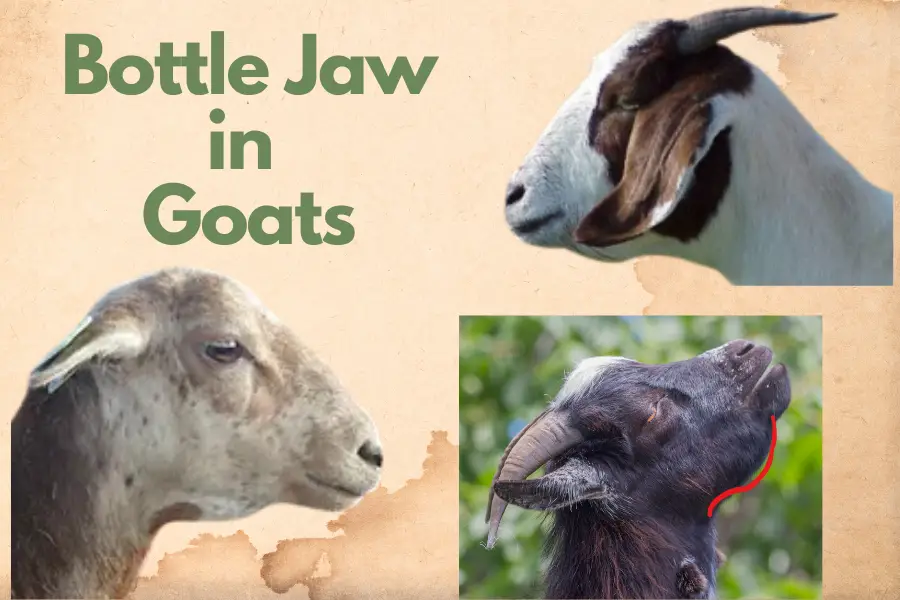
Table of contents
- Key Takeaways about Bottle Jaw in Goats
- What Is Bottle Jaw In Goats?
- Symptoms Of Bottle Jaw In Goats
- Causes Of Bottle Jaw In Goats
- Diagnosing Bottle Jaw And Anemia In Goats
- Bottle Jaw In Goats Treatment
- Prevention Strategies For Bottle Jaw In Goats
- Video – Treating Bottle Jaw in Goats by Parasite Management
- Conclusion
Key Takeaways about Bottle Jaw in Goats
- Bottle jaw in goats is a swelling under the chin caused by edema, indicating an underlying health issue such as severe anemia, which is usually, but not exclusively, caused by internal parasites like the barber pole worm.
- Anemic goats may display symptoms like pale mucous membranes, lethargy, weakness, loss of appetite and weight loss. Proper nutrition management and adequate supplementation with essential vitamins and minerals are necessary to treat them effectively.
- Regular monitoring of goat herds for signs of barber pole worm, coccidiosis, liver fluke infection, Johne’s disease or anaplasmosis can help prevent these diseases from causing serious health problems among your animal stock.
- If you notice any physical signs such as visible swelling under the chin area or changes in behavior among your goats – including decreased appetite, lethargy upper respiratory tract issues or reduced milk production – it’s important to consult a qualified veterinarian immediately for proper diagnosis and effective treatment options.
What Is Bottle Jaw In Goats?
Bottle jaw in goats is a condition characterized by swelling under the chin caused by excess fluid building up due to reduced blood protein levels. Bottle Jaw is not a disease itself, but rather it is a symptom that indicates that there in an underlying problem.
Definition And Description
Bottle jaw in goats, also known as submandibular edema, is a prominent swelling under the chin and lower jaw area which signals an underlying health issue. The fluid is clear and the swelling is has a jelly-like feel to it.
Parasites cause anemia and hypoproteinemia. Hypoproteinemia, which is low protein causes the small blood vessels to break down, and fluid starts to leak through and accumulate in the neck tissue. This swelling is called edema, and is known as bottle jaw in goats.
This condition typically arises along with severe anemia brought on by internal parasites like the barber pole worm (Haemonchus contortus).
The development of bottle jaw results when fluids leak into extracellular spaces leading to visible swelling. It is critical for goat owners to recognize this symptom as it usually reveals a more extensive problem affecting their goat’s overall well-being.
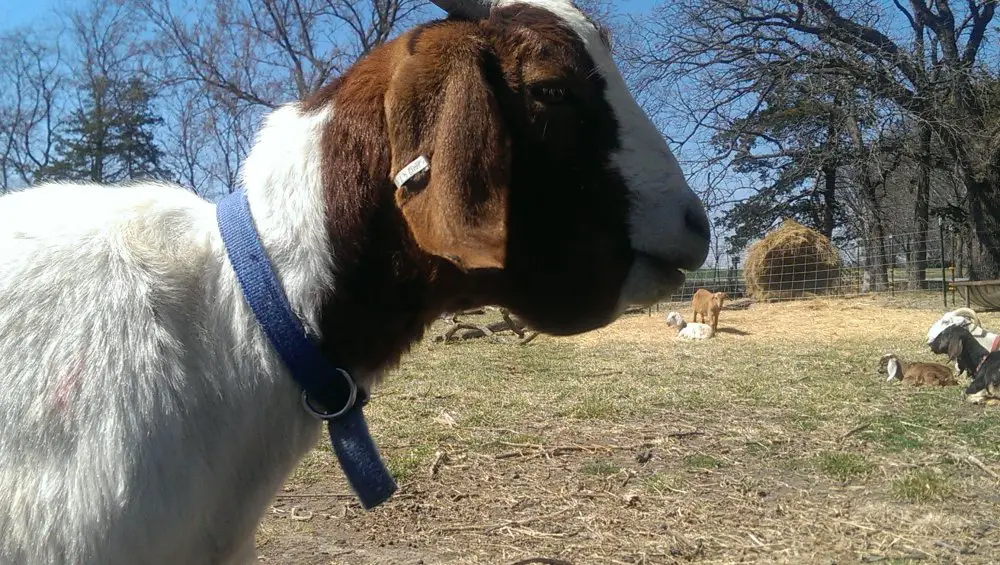
Symptoms Of Bottle Jaw In Goats
Bottle jaw in goats presents as a swelling under the chin caused by edema, which can lead to difficulty breathing or swallowing.
Physical Signs
As a goat owner, it is crucial to recognize the physical signs of bottle jaw in your goats, as early detection can facilitate effective treatment and reduce the risk of complications. Some common physical signs include:
- Swelling of the lower jaw: The most prominent sign of bottle jaw is visible swelling under the chin, which can be soft or firm due to edema.
- Pale mucous membranes: Check for pale gums, eyelids, and inner lips, indicating anemia and a higher likelihood of bottle jaw.
- Emaciation: Anemic goats may display weight loss and poor body condition due to malnutrition.
- Abdominal swelling: Fluid accumulation in the abdominal cavity may occur due to severe anemia.
- Labored breathing or panting: Goats with bottle jaw may struggle with their breathing as a result of congestive heart failure resulting from chronic anemia.
- Lethargy or weakness: Affected goats may be less active than usual and exhibit general weakness.
By carefully observing your goats for these physical signs, you can promptly address potential issues related to bottle jaw and ensure optimal health for your herd.
Changes In Behavior
Goats experiencing bottle jaw may exhibit noticeable changes in their behavior due to the discomfort and health issues caused by this condition. These behavioral changes include:
- Decreased appetite or refusal to eat, leading to weight loss and weakness.
- Lethargy or reduced energy levels, as the goat struggles with anemia.
- Increased isolation from the herd, possibly due to discomfort or difficulty moving around.
- Grinding teeth or signs of pain when eating, which can indicate internal parasites or gastrointestinal issues.
- Restlessness, lying down more often, or frequently switching between standing and lying down positions.
- Labored breathing, coughing, or nasal discharge due to underlying infections or respiratory conditions.
- Poor coat condition and hair loss as a consequence of nutritional deficiencies and overall ill health.
- Reduced milk production in lactating goats, resulting from diminished energy reserves and poor body condition.
Monitoring these behavioral changes alongside physical symptoms can help goat owners identify bottle jaw early on and seek appropriate veterinary interventions for their goats’ well-being.
Causes Of Bottle Jaw In Goats
Bottle jaw in goats is caused by low protein or hypoproteinemia. The blood vessels lose structure, and liquid seeps into the surrounding tissue. This can be caused by or accompanied by by various factors such as anemia, nutritional deficiencies, and infectious diseases like coccidiosis and liver fluke; read on to learn how to diagnose and treat this condition.
Anemia
Parasitic infestation with Barber Pole Worms is a common problem that leads to anemia and eventual bottle jaw in goats. Symptoms include pale mucous membranes, lethargy, weakness, loss of appetite, and weight loss.
Anemia results from a lack of red blood cells, which can be caused by several factors such as internal parasites like the barber pole worm, copper deficiency or toxicity, or traumatic injury.
In the United States, haemonchosis, an infestation by Haemonchus contortus, also known as the barber pole worm, is the leading cause of bottle jaw in goats. In Australia, this is also the leading cause in the summer and autumn months.
Regular fecal testing for worms is essential to prevent these conditions and limit damage to the goat’s health. Additionally, use the FAMACHA scoring system to detect anemia. (Refer to the video at the bottom of our Cydectin for Goats page to learn how to use FAMACHA)
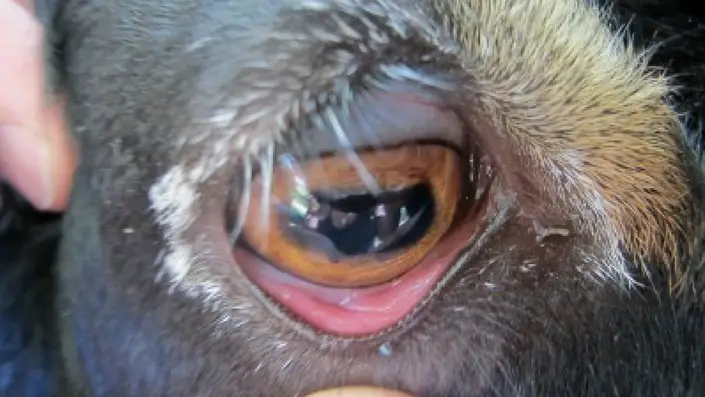
Nutritional Deficiencies
Good nutrition is essential for the health of your goats. Nutritional deficiencies can lead to a variety of health problems, including anemia and bottle jaw.
Copper deficiency or toxicity is one of the common causes of anemia in goats. Goats require copper in their diets to produce red blood cells that carry oxygen throughout their bodies.
To prevent nutritional deficiencies and ensure proper nutrition, it’s important to provide your goats with a balanced diet and access to fresh water at all times.
Infectious Diseases
Infectious diseases are another potential cause of bottle jaw in goats, as they tend to cause anemia. Coccidiosis, a common intestinal parasite that affects young goats, can lead to anemia and ultimately bottle jaw if not treated promptly.
Chronic liver fluke is another infectious disease that can cause severe anemia and fluid retention leading to bottle jaw in goats. Johne’s Disease (also known as Paratuberculosis) and Anaplasmosis are two other infections that may result in anemia and the development of edema under the goat’s chin, which causes the classic “bottle jaw” appearance.
Regular monitoring for signs of these illnesses is crucial, as they can be life-threatening if left untreated.
Coccidiosis
Coccidiosis is a common parasitic illness that can affect your goats and lead to anemia and bottle jaw. It’s caused by coccidian protozoa, which are small organisms that live in the digestive tract linings of goats.
Goats with coccidiosis can experience symptoms such as diarrhea, weight loss, decreased appetite, lethargy, and anemia. Sanitation plays a crucial role in preventing the spread of coccidiosis among your goat herd.
Regular cleaning and disinfection of feeders, waterers, housing facilities, along with proper nutrition management will lower the risk of infection from coccidia oocysts shed in feces by infected animals.
Flukes
Flukes are a type of internal parasite that can cause bottle jaw and anemia in goats. The most common types of flukes that affect goats include Fasciola hepatica and Fascioloides magna.
In Australia, during the winter and spring, liver flukes are the mostly likely cause of bottle jaw in goats.
These parasites attach to the digestive tract linings, causing edema or swelling, including submandibular edema (swelling of the head and neck) seen as bottle jaw. Fluke infections can also lead to chronic liver damage if left untreated.
Symptoms of fluke infection may include decreased appetite, poor coat condition, weight loss, reduced milk yield, lethargy, diarrhea with yellow-green feces containing undigested food particles and sporocysts affecting your goat’s mucous membranes.
Johne’s Disease
Johne’s Disease is a chronic bacterial infection that can affect goats and other animals. It is caused by Mycobacterium avium subspecies paratuberculosis (MAP) bacteria, which attack the goat’s digestive system’s lining.
Symptoms of Johne’s disease include diarrhea and extreme weight loss.
Johne’s Disease spreads through infected feces or milk from an infected doe to her offspring. Since the MAP bacterium is challenging to detect and treat once inside the animal, prevention strategies focus on reducing exposure to contaminated environments or manure sources.
Regular testing of new goats before introducing them to your herd can help control outbreaks from occurring.
Anaplasmosis
Anaplasmosis is a blood parasite caused by Anaplasma ovis that can lead to anemia and bottle jaw in goats. This disease is transmitted by blood-sucking external parasites like ticks, which feed on the infected goat’s blood and spread the infection to other animals.
Symptoms of anaplasmosis include lethargy, loss of appetite, pale mucous membranes, fever, weight loss, and reduced milk production.
While there are no vaccines available for anaplasmosis in goats yet, prevention measures such as regular tick control can reduce the risk of contracting this disease. Timely diagnosis through physical examination or blood tests followed by prompt treatment with injectable B-12 supplements or dewormer medication can also help prevent severe cases of anemia leading to bottle jaw in goats.
Diagnosing Bottle Jaw And Anemia In Goats
Since bottle jaw is a symptom and not a disease, you won’t be diagnosing it. You will be instead using the symptom to find out what the underlying causes is. If the goat is anemic, then you will need to treat that.
Physical Examination
A physical examination is an essential step in diagnosing bottle jaw and anemia in goats. During the exam, a veterinarian will check for physical signs such as submandibular edema (swelling beneath the chin) and assess changes in behavior.
It’s important to note that bottle jaw is not an infection and cannot be drained. Therefore, identifying the underlying cause of anemia through a comprehensive physical examination is crucial for effective treatment.
Symptoms that Mimic Bottle Jaw
Not all swelling under the chin is Bottle Jaw in goats. There are other possibilities, although they are less likely. An abscess or a snake bite could causes swelling in the neck. A swollen lymph note could also cause a lump. In these cases, however, the swelling would feel more firm than in bottle jaw. Additionally, there is condition called milk goiter, but it occurs on the neck not under the jaw. If you find any of these, then take the appropriate action with the guidance of your trusted vet.
Blood Tests for Anemia
To determine if your goat has bottle jaw, it’s crucial to get a proper diagnosis from a veterinarian. A physical examination alone may not be enough because there can be different causes of anemia in goats.
Blood tests will help identify the underlying cause of bottle jaw and determine the severity of the anemia.
FAMACHA Test for Anemia
Use the FAMACHA Method to determine if your goat has anemia. Watch the Purdue University video at the bottom of this page to learn more.
Work with Your Veterinarian
It’s essential to take action as soon as possible when you notice symptoms of bottle jaw in goats. Identifying the root cause through blood tests allows farmers to tailor treatment properly, including administering medication with dewormers like Ivomec or Prohibit and providing nutritional supplements such as iron supplements or Nutri-Drench for goats suffering from nutrient deficiencies.
Bottle Jaw In Goats Treatment
De-worming, properly administering Fenbendazole, Valbazen, Ivermectin or Cydectin, or other anthelminthics, or providing nutritional supplements like iron (Such as UltraCruz) for anemic goats are effective treatment options for bottle jaw in goats.
Many dewormers are not FDA approved for use on goats. Their use is considered extra label (off label) use.
Per Cornell University: “The FDA regards extra-label use of drugs as an exclusive privilege of the veterinary profession and is only permitted when a bona fide veterinarian-client-patient relationship exists and an appropriate medical diagnosis has been made.”
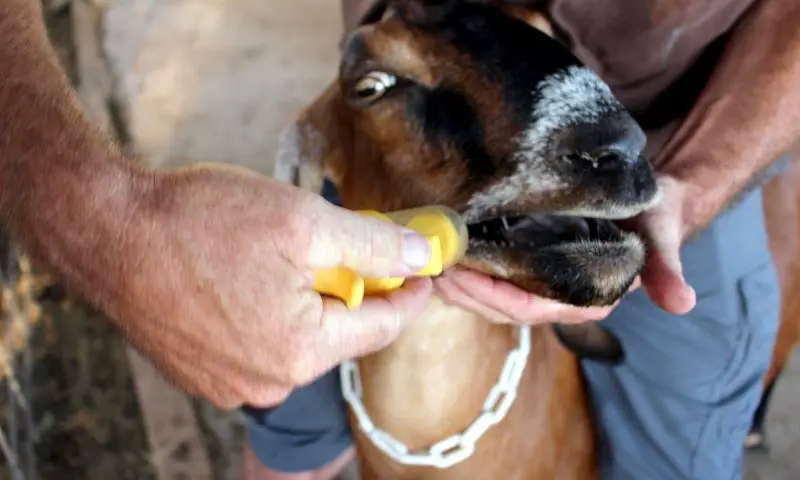
De-worming
De-worming is a crucial treatment option for goats with bottle jaw caused by internal parasites, especially the barber pole worm. Regular de-worming can prevent anemia and reduce the risk of developing bottle jaw.
It’s also important to note that overusing de-worming medications can lead to drug resistance in worms, making future infections much harder to treat. Use the FAMACHA method and discuss with your vet or extension agent.
It’s essential for goat owners to use FAMACHA scoring, monitor their goats’ fecal egg counts and only administer medication when necessary based on veterinary recommendations. In addition to de-worming, supplements like B-12 , Manna Pro, or Red Cell can help rebuild lost blood cells and restore vitamins and minerals in anemic goats.
Ivermectin
One of the most effective medications for treating bottle jaw in goats is ivermectin, a broad-spectrum anthelmintic drug. It works by disrupting nerve impulses in parasites, effectively paralyzing and killing them.
This medication is highly recommended to control internal parasites like the barber pole worm, which are often responsible for causing anemia and subsequently leading to bottle jaw in goats.
However, it’s important to be cautious when administering this medication as over use can lead to resistance.
Ivermectin is not FDA approved for goats. It can only be administered under the off-label by a licensed veterinarian.
Nutritional Supplements
Proper nutrition is essential to prevent and treat bottle jaw in goats. Nutritional supplements can help maintain goat health and keep their immune system strong, preventing them from succumbing to anemia or other nutritional deficiencies that can lead to bottle jaw.
Nutri-Drench for goats is a liquid supplement that helps replenish vital nutrients quickly for malnourished goats. B-12 injections can also be used to treat anemia in goats, while Nutri-Drench provides a vitamin boost that can help support goat health more generally.
Bottle jaw can be caused by several factors related to nutrition and management; hence it’s crucial to ensure goat herds have nutritious diets while monitoring possible risk factors like soil testing for molybdenum levels or avoiding feeding Brassica plants (which contain goitrogenic substances).
It’s also important not to over-supplement with copper in feed since this may cause copper toxicity leading to bottle-jaw-like symptoms.
Iron Supplements For Anemic Goats
Iron supplements can be a crucial part of treating anemia in goats with bottle jaw. Some options for iron supplements include Ferrodex 100 and Dextran, which can help to boost iron levels in the bloodstream and improve overall health.
Red Cell and other brands of iron supplements are an effective oral iron supplement commonly used to treat anemia in goats. Anemic goats often suffer from a loss of energy and appetite, weakness, and pale mucous membranes.
Red Cell works by rebuilding red blood cells in the goat’s bloodstream, boosting energy levels and overall health. When administering Red Cell, it’s crucial to follow dosage instructions accurately to prevent overdosing or underdosing the goat.
It’s important to note that while Red Cell can work wonders for treating anemia in goats, it should not be solely relied on as a long-term solution without addressing underlying causes such as parasites or nutritional deficiencies. In a study conducted by Joan Burke of the USDA, Red Cell did not influence Fecal Egg Counts (FEC) or Packed Cell Volume (PCV).
Prevention Strategies For Bottle Jaw In Goats
To prevent bottle jaw in goats, regular parasite control and proper nutrition and management are recommended.
Regular Parasite Control
Parasites are one of the leading causes of bottle jaw in goats, making regular parasite control crucial for their health. Without proper management, parasites can quickly infest your herd and lead to anemia, which is a severe underlying cause of bottle jaw. Here are some important facts about regular parasite control for goat owners:
- Internal parasites in goats can go unnoticed until it’s too late. Therefore, it’s vital to establish regular monitoring and targeted deworming protocols to avoid infestations altogether.
- Administering dewormers immediately when bottle jaw is noticed without following the schedule isn’t enough as it may lead to drug resistance and reinfection.
- Using fecal egg counts (FECs) to track parasitic infestations and assess the effectiveness of treatments is important.
- Establishing a grazing rotation schedule allows pasture rest and reduces the risk of contamination and infection.
- Grazing season needs careful consideration as overgrazing can lead to parasite reinfestation; however, allowing adequate time between grazing seasons gives worms threatening your goats’ health enough time to die off.
- Goats that graze with sheep or cattle should be given additional attention for internal parasite prevention since they have different worm species that should not cross-contaminate.
- Always consult with a veterinarian on appropriate treatment schedules based on local disease prevalence rates and geographic location.
Regular parasite control is an essential part of maintaining healthy goats, preventing bottle jaw, and ensuring optimal production.
Proper Nutrition And Management
Proper nutrition and management are crucial in preventing bottle jaw in goats. Here are some tips to keep your goats healthy:
- Provide a balanced diet that meets their nutritional needs: Goats require a diet rich in fiber, high-quality protein, vitamins, and minerals. Feeding them good quality hay, pasture, and goat feed supplements is essential.
- Ensure they get enough water and salt: Freshwater should always be readily available for your goats as they need it to stay hydrated. Also, provide them with salt blocks or loose minerals to prevent mineral deficiencies.
- Keep their living space clean: Cleanliness is vital to goat health. Ensure their living spaces are clean and hygienic by regularly cleaning out stalls, removing soiled bedding promptly, and keeping the area well-ventilated.
- Practice good parasite control: Parasites like worms cause anemia leading to bottle jaw. Check for worm presence using fecal egg counts and selectively deworm based on the results rather than routinely deworming.
- Monitor their health regularly: Early detection of any potential health issues can make all the difference in getting your goats back on track. Keep an eye out for symptoms such as weight loss or changes in behavior.
By following these practices, you can help keep your goats healthy and prevent bottle jaw from occurring due to poor nutrition or parasitic infections. Remember that proper management strategies help promote overall good health and prevent major problems down the line.
Video – Treating Bottle Jaw in Goats by Parasite Management
In this official video from Oklahoma State University, Veterinarian Dr. Barry Whitworth gives a through overview of how to control parasites in your herd in order to prevent bottle jaw and anemia. He addresses parasite management after a drought. At 11:24 is where Dr. Whitworth starts discussing bottle jaw in goats, and shows an illustrative example.
Conclusion
In conclusion, bottle jaw in goats is not a disease but rather a symptom of an underlying condition, such as severe anemia caused by internal parasites or nutritional deficiencies.
Early detection and treatment are crucial to preventing long-term health issues. Regular monitoring, proper nutrition and management, and parasite control can help prevent future occurrences of bottle jaw in goats.
If you notice any signs of edema under your goat’s chin or changes in behavior, it is important to consult with a veterinarian immediately for proper diagnosis and effective treatment options.
FAQs:
What is bottle jaw in goats?
Bottle jaw in goats refers to a condition where the lower jaw swells, giving the appearance of a round or swollen “bottle”. It is a symptom, not a disease itself Bottle Jaw in goats can be due to a number of factors such as internal parasites or poor nutrition.
Preventing bottle jaw involves regular deworming and ensuring your goats have access to good quality food and water. It’s also important to keep their living environment clean and sanitary.
It is caused by hypoproteinemia, which is low protein. This causes the small blood vessels to break down, and fluid starts to leak through them and accumulate in the tissue under the lower jaw. The hypoproteinemia is usually caused by parasites.
Bottle jaw presents as edema in the lower jaw of the goat. Bottle jaw is not the disease but the symptom. Other symptoms that accompany bottle jaw may include lethargy, loss of appetite, pale gums, weight loss, and difficulty breathing. Use these symptoms to determine what is causing the illness.
Treatment for bottle jaw involves addressing the underlying cause (such as treating internal parasites) while also providing supportive care to improve nutrition status (e.g., administering iron supplements). Consultation with a veterinarian is recommended for appropriate diagnosis and treatment options specific to your goat’s individual needs.


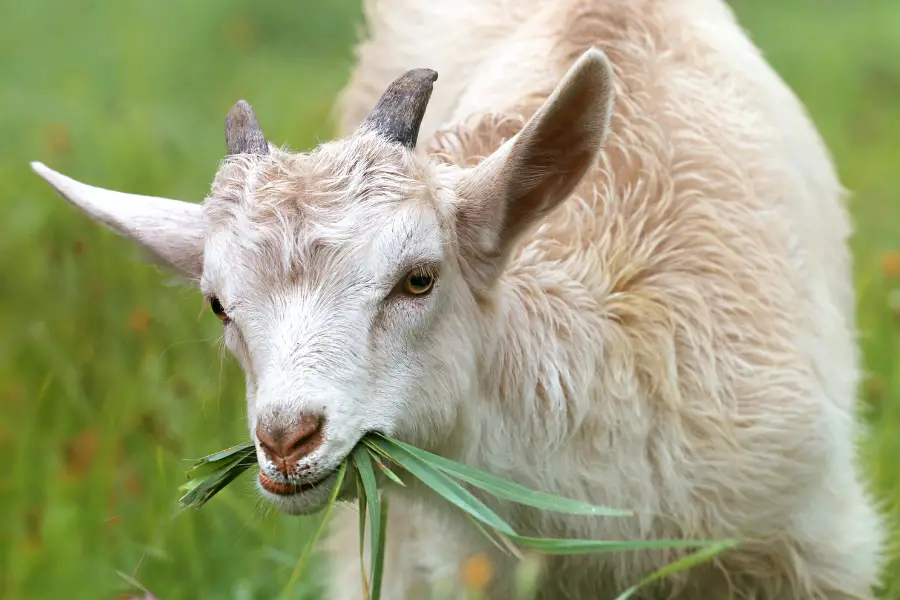
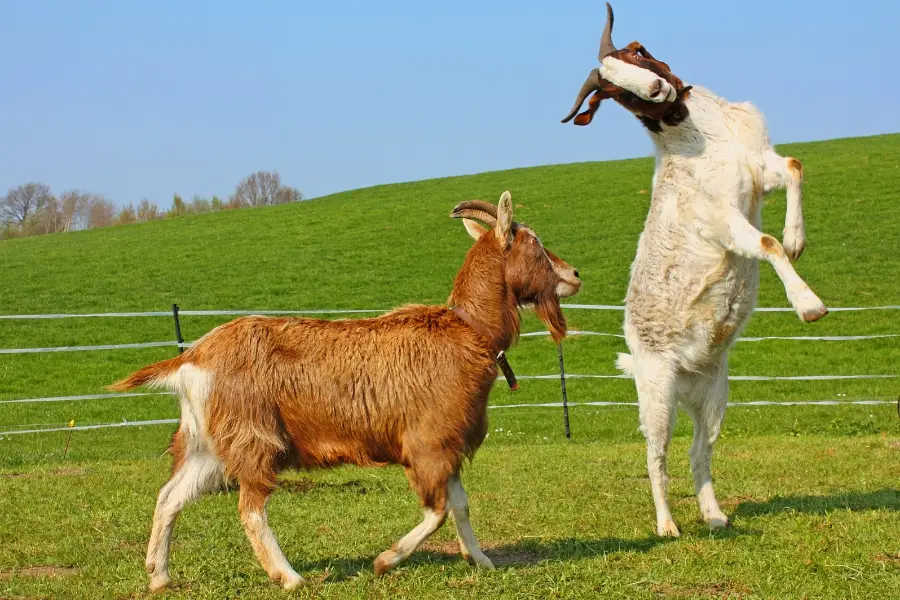
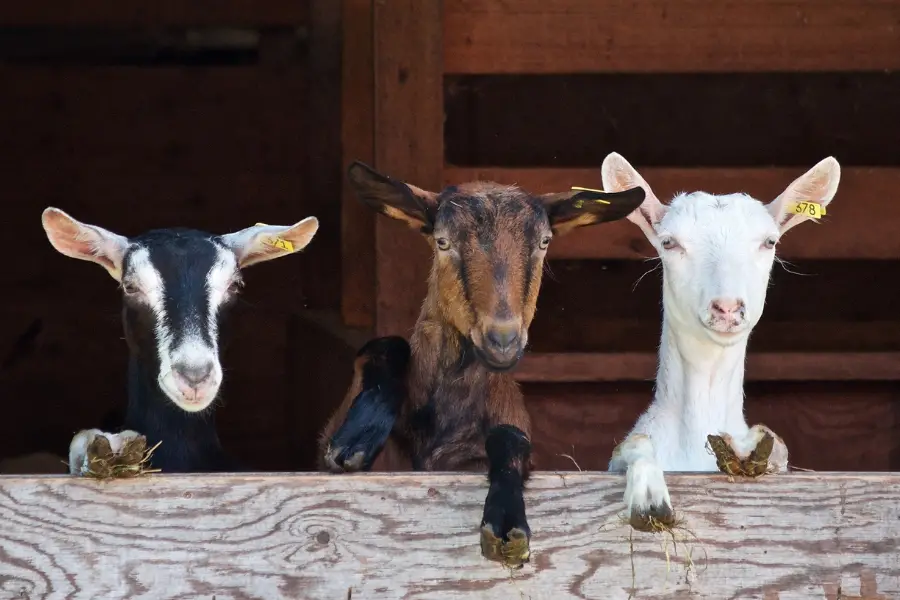
One response to “Bottle Jaw in Goats: Causes & Treatments”
Thanks so much for the educative material on the diseases affecting goats